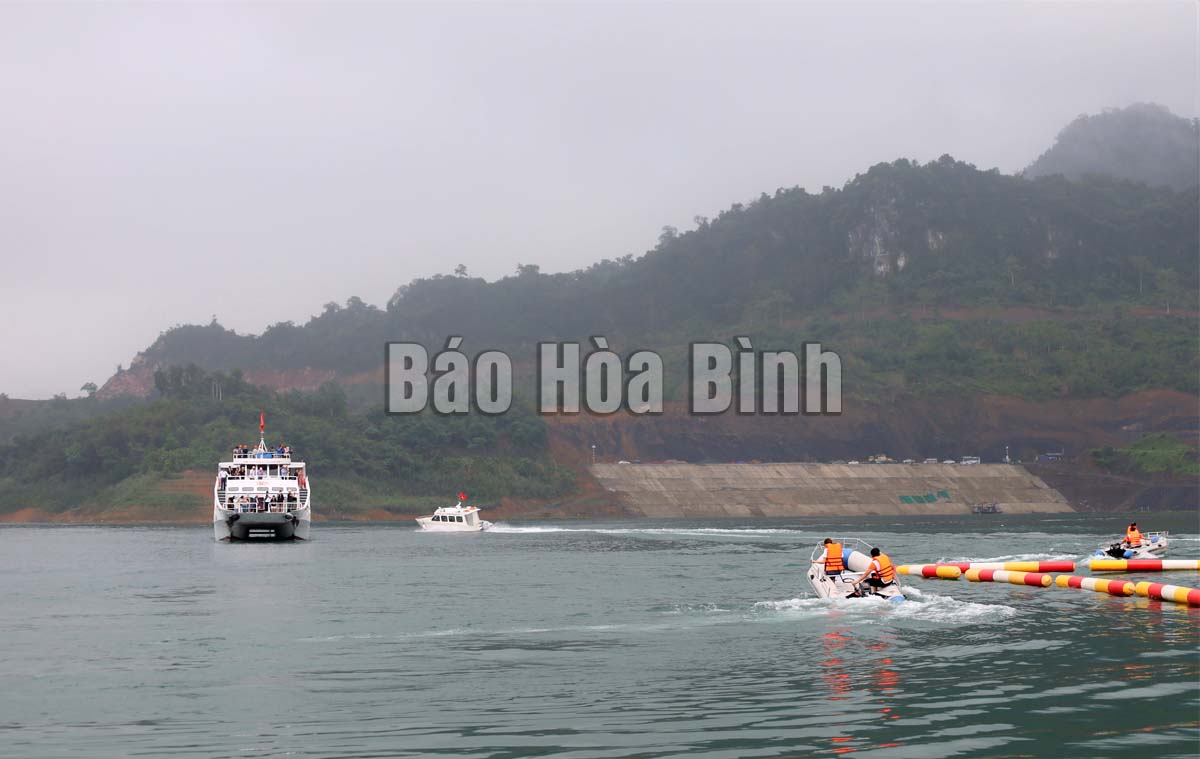
(HBO) - The Hoa Binh Tourism joint Stock Company has been operating a tour exploring Hoa Binh lake and the Muong culture space in Hoa Binh from October 1 – December 31 to respond to tourism stimulus activities in the locality. Accordingly, the business commits to cutting by 20 – 50 percent of prices for its products and services, including accommodation, dining, high-quality tourism boat, outdoor events, among others at Ngoi village tourist site.

The tourism boat of the Hoa
Binh Tourism JSC takes tourists to discover Hoa Binh lake.
As a reputable tourism service supplier, the Hoa Binh Tourism JSC has built and
exploited tourism products in Hoa Binh and the northwest region, with the aim
of promoting unique culture identities and introducing the tradition of local
ethnic groups, especially the Muong culture, to visitors.
Apart from investing in two 5-star eco-resorts with 450 rooms and many
utilities and services, the company is also cooperating new tours which are
attractive to travel agencies, tour operators, and domestic and international
tourists.
The programme to experience Muong cultural space and explore Hoa Binh lake is
the most attractive tour.
According to vice director of the company Vu Thi Anh Ngoc, the tour is the most
attractive service of the business.
Recently, a number of delegations of tourists have confirmed to join and
respond to this attractive tour.
Departing from Hanoi, visitors move to Hoa Binh city and check in Hoa Binh
hotel in Hoa Binh city, then freely explore the miniature Muong cultural space
and take nice photos at green, airy and impressive space in the hotel.
In the afternoon, tour guides will pick visitors to visit the Hoa Binh
Hydropower plant and offer incense at the Uncle Ho monument.
Visitors will have their dinner at Hoa Ban Restaurant with the best dishes of
the land of Muong such as upland sticky rice, Da River fish, hill chicken, and
pork.
After the dinner, visitors will have a change to join a special ethnic music
programme performed by young local ethnic men and women, including a
traditional bamboo dance performance, and experience the
Ruou Can (wine drunk out of a jar through pipes) culture
of Muong ethnic people.
In the second day, after the breakfast in the hotel, visitors will be moved by
bus to Ngoi Hoa port, boarding boats and starting their journey on Hoa Binh,
which is called "Ha Long bay on the mountain.
On this journey, visitors will visit Chua Thac Bo Temple, a sacred temple that
attracts thousands of tourists every year; discover Thac Bo cave which is
divided into many floors with unique stalactite blocks of various shapes; and
visit Ngoi village in Ngoi Hoa bay, and a community cultural tourist site of
the Muong people that still retains wild and majestic features. The visitors
will have a lunch at Da Giang Floating Restaurant which is famous for Da River
fish.
Before returning to Hanoi, tourists will visit an orange garden in Cao Phong
town, pick ripe oranges by themselves as gifts and enjoy the fresh taste of
orange right at the garden.
With an increasingly vibrant and widespread emulation movement aimed at building cultured residential areas and cultured families, Yen Thuy District has been making steady progress toward improving both the material and spiritual well-being of its people, while fostering a civilized, prosperous, beautiful, and progressive community.
Once lacking recreational spaces and community facilities, Residential Group 2 in Quynh Lam Ward (Hoa Binh City) has recently received attention for the construction of a new, spacious, and fully equipped cultural house. The project followed the model of state support combined with public contributions in both labor and funding.
The "All people unite to build cultural life" movement, which has been effectively integrated with Kim Boi district’s socio-economic development goals, is fostering a lively spirit of emulation across local residential areas, hamlets, villages, public agencies, and enterprises. In addition, through the initiative, traditional cultural values are being preserved and promoted, while community solidarity and mutual support in poverty reduction and economic development are being strengthened.
A working delegation of the Hoa Binh provincial People’s Committee led by its Permanent Vice Chairman Nguyen Van Toan on June 11 inspected the progress of a project to build the Mo Muong Cultural Heritage Conservation Space linked to tourism services in Hop Phong commune, Cao Phong district.
Born and growing in the heroic land of Muong Dong, Dinh Thi Kieu Dung, a resident in Bo town of Kim Boi district, in her childhood was nurtured by the sweet lullabies of her grandmother and mother. These melodies deeply imprinted on her soul, becoming an inseparable part of her love for her ethnic group's culture. For over 20 years, this love for her hometown has driven Dung to research, collect, and pass down the cultural values of the Muong people to future generations.
In the final days of May, the Ethnic Art Troupe of Hoa Binh Province organized performances to serve the people in remote, mountainous, and particularly disadvantaged areas within the province. These were not just ordinary artistic shows, but they were the meaningful journeys aimed at spreading cultural values, enhancing the spiritual life of the people and contributing to the preservation of ethnic minority cultural identities.



